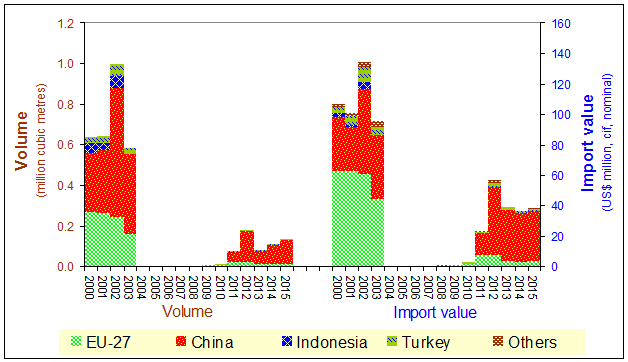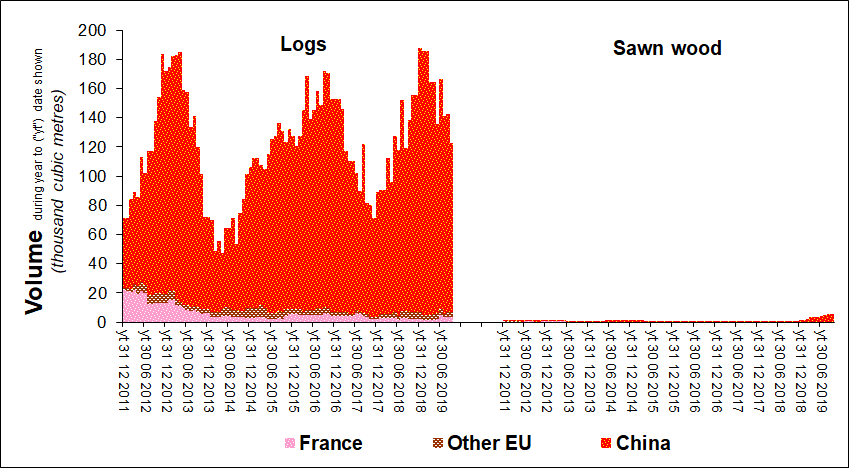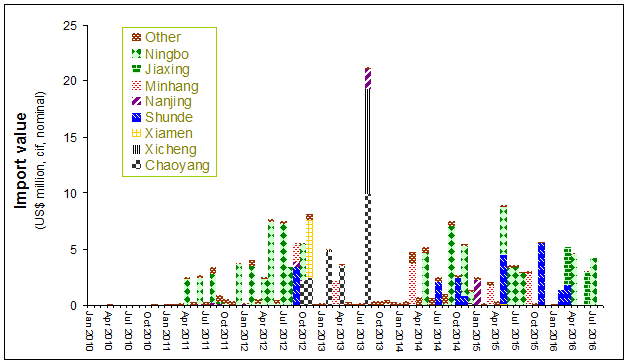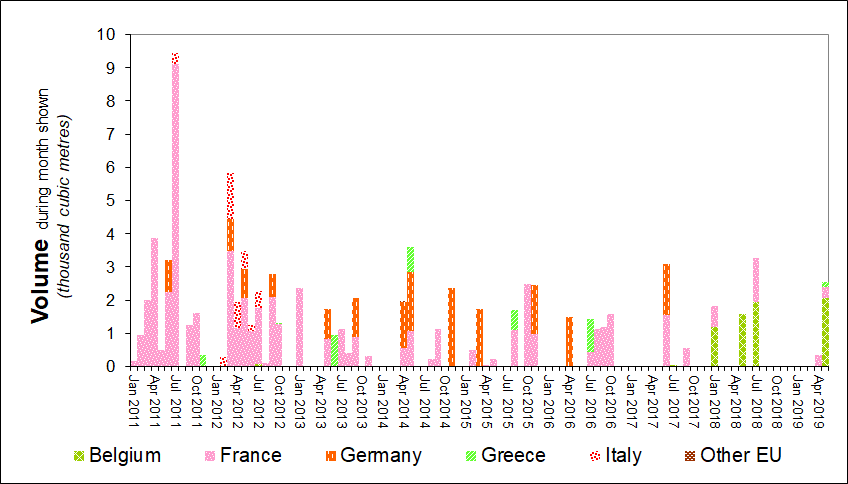|
|
||
|
|
||
|
Liberia |
||
|
Chart 3a - China's monthly imports of logs from Liberia (source: based on China Customs)
Chart 3b - EU member states' monthly imports of logs from Liberia (source: based on Eurostat) |
||
|
Charts 2 and 3 above indicate the quantities of logs being imported from Liberia by EU member states and locations in China. It seems that the mix of destinations and relative proportions are currently similar to those prevalent during Liberia's most recent civil war. Whereas much of the timber imported into China at the time of that war entered through Chiwan and Penglai, most now seems to enter through Ningbo. Given its name[footnote 20], some presumably on behalf of one particular company (which appears to have little immediate substance). Deriving particularly from so-called Private Use Permits, much of that logging appears to be not only of highly dubious legality but also grossly unsustainable socially and environmentally[-]. Liberia exported
negligible quantities of timber during the mid-1990s - primarily on
account of political instability. More recently, a "strong man"
emerged and the timber industry was expanded rapidly, primarily through
the operations of at least one (ethnic Chinese) company new to the
country. This expansion has been shown to be linked to the procurement
of weapons using revenue derived from log exports with which to retain
political power (by military means) - and should therefore be included
in the broad category of "illegal
logging". To its credit, the United Nations (from mid-2003) in effect prohibited its member countries from importing logs from Liberia. China much the largest importer between 1999 and 2003 and also France, sought to prevent this prohibition. During 2002, China's imports alone matched the highest previously recorded level of Liberian exports. France continued to import substantial quantities of timber during the early 1990s, despite a ban on timber exports, partly in exchange for military support to the then ruling elite. No legal timber from commercial concessions was for a few years after UN sanctions were lifted (- 2006).[§54] Rather than accept the offer of financial income in exchange for continuing to exclude industrial scale logging, the government has been persuaded to restart such logging. The processes by which enterprises have been allocated concessions[-][§55 et seq] and changes being made in the law[-] make it unlikely that timber exports from those concessions will be deemed sufficiently legal to comply with the EU's proposed due diligence regulation,[-] let alone the US Lacey Act. Indeed the only importing country which might willingly accept timber from Liberia is China - and China would add as little value in Liberia as feasible, demanding logs now that Equatorial Guinea and Gabon prohibit the export of logs and redeploying foreign labour. Consequently, it is highly likely that enterprises linked to China have lobbied for a resumption of logging in Liberia. China is presumably the destination for the output which Samling hopes[-] to achieve through its associates in Liberia. Ironically, most of the accessible forest in the newly allocated concessions has been so badly managed that the profitability of even the sort of logging which was common in Equatorial Guinea and the south west of Congo (Brazzaville) during the last decade or so is unlikely to be great. One might argue that lack of capacity coupled with collusion between government and prospective participants in the resurgent timber industry has led to the information on which those seeking concessions have bid being misleading.[-] Clearly, concessionaires would have used that information at their own risk, and not be eligible for any redress. It is likely that medium-sized concessions (5,000ha-49,999ha), for which competitive bidding and sustaionable managgement do not seem to be required[p3], will be assigned to sleeping partners of major logging groups who consolidate their interests illicitly by logging as subcontractors - as they appear to have done elsewhere [slide 5 item 10] (particularly in Equatorial Guinea).
Further reading: "Signing their Lives away: Liberia’s Private Use Permits and the Destruction of Community-Owned Rainforest" Global Witness, Save My Future Foundation and Sustainable Development Insitute (09 2012).
|
||
|
Copyright
globaltimber.org.uk
|




